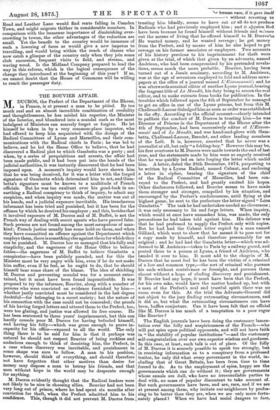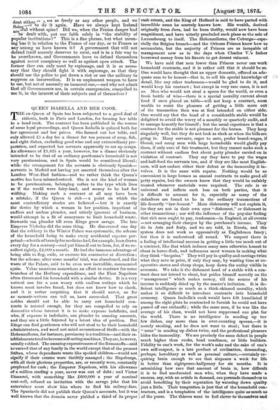THE BOUVIER AFFAIR.
MDUCROS, the Prefect of the Department of the Rhone, . in France, is at present a man to be pitied. By too much zeal and an almost incredible combination of credulity and thoughtlessness, he has misled his superior, the Minister of the Interior, and blundered into a scandal such as the most indulgent of Ministers can scarcely forget or forgive. He let himself be taken in by a very common-place impostor, who had offered to keep him acquainted with the doings of the Radical Committees of Lyons and Marseilles, and their com- munications with the Radical chiefs in Paris ; he was led to believe, and he led the Home Office to believe, that he had discovered a Radical plot to which Gambetta was a party ; and when, by a series of perquisitions and arrests, the affair had been made public, and it had been put into the hands of the judicial authorities, it was instantly discovered that he had been imposed upon. A moment's inquiry would have shown him that he was being deceived, for it was a letter with the forged signature of Gambetta which determined him to act, and Gam- betta's signature must be known to a multitude of French officials. But he was too exultant over his good-luck in un- earthing a Radical conspiracy to think of inquiry, to admit any suspicion, and when inquiry was made, the matter was out of his hands, and a judicial exposure inevitable. His treacherous informant has been tried and punished, but it has been for the offence by which he deceived his employer ; and this, besides that it involved exposure of M. Ducros and of M. Buffet, is not the French way of dealing with secret agents who have proved false. Such persons are not found among the most scrupulous of man- kind; French justice usually has some hold on them, and when they have committed an offence against the Department which employs them, there is something else against them for which they can be punished. M. Ducros has so managed that his folly and simplicity, and the eagerness of the Home Office to believe fables—the eagerness of M. Buffet to believe Gambetta a conspirator—have been publicly paraded, and for this the Minister must be very angry with him, even if he do not make him suffer, even if he feel, as he ought to do, that he should himself bear some share of the blame. The idea of shielding M. Ducros and preventing scandal was for a moment enter- tained, but it must have been found impracticable. It was proposed to try the informer, Bouvier, along with a number of persons who were convicted on evidence furnished by him— whether justly convicted must be considered in the last degree doubtful—for belonging to a secret society; but the nature of his connection with the case could not be concealed; the proofs of his having forged letters and uttered them to the Prefect, too, were too glaring, and justice was allowed its free course. He has been sentenced to three years' imprisonment, but this can hardly console poor M. Ducros for having befooled himself, and having his folly—which was gross enough to prove in- capacity for his office—exposed to all the world. The only thing there is to be said for him is that it perhaps was natural he should not suspect Bouvier of being reckless and audacious enough to think of deceiving him, the Prefect, in a case where discovery was inevitable, and punishment in some shape was sure to follow. A man in his position, however, should think of everything, and should therefore not have forgotten that other motives than desire for money may dispose a man to betray his friends, and that men without hope in the world may be desperate enough for anything.
Ducros evidently thought that the Radical leaders were not likely to be nice in choosing allies. Bouvier had not been very long out of prison, where he had spent six months after conviction for theft, when the Prefect admitted him to his confidence. This, though it did not prevent M. Ducros from trusting him blindly, seems to have cut .a£ all do not produce Radicals who had previously employed him ; and it appaten Red have been because he found himself without friends and wi:ence out the means of living that he offered himself to M. Ducrob".he He wanted money, and he wanted revenge • he got money from the Prefect, and by means of him he also hoped to get revenge on his former associates or employers. Two accounts of his history previous to his imprisonment for theft were given at the trial, of which that given by an advocate, named Andrieux, who had been compromised by his pretended revela- tions, seems much the more probable. Bouvier, having been turned out of a Jesuit seminary, according to M. Andrieux, was at the age of seventeen employed to fold and address news- papers at the office of a journal named L'Excommunie; and he was afterwards nominal editor of another Lyons journal,bearing the fragrant title of Le Maudit, his duty being to screen the real editor, and to make extracts from books for publication. In the troubles which followed upon the 4th of September he managed to get an office in one of the Lyons prisons, but from this M. Challemell-Lacourdislodgedhim as soon as order was established in the city. According to the official account—clearly intended to palliate the conduct of M. Ducros in trusting him—he was Director of Prisons in the Department of the Rhone after the 4th of September, had been successively editor of L'Excom- made and of Le Maudit, and was hand-and-glove with Gam- betta, Challemel-Lacour, Barodet, and other leading members of the Left. It is, however, asserted that he never was a journalist at all, but only "a folding-boy." However this may be, his first overtures to M. Ducros were made towards the end of last year, and the statements made by him were so eagerly received that he was quickly led on into forging the letter which undid him. A letter, dated the 26th December, 1874, purporting to be written by a Lyons Radical, named Cabaut, and enclosing a letter in cipher, bearing the signature of the chief of the Radical Committee of Marseilles, had been con- veyed to the Prefect, and had greatly excited his hopes. Other disclosures followed, and Bouvier seems to have made them stronger and stronger, compelled by his situation, and encouraged by the Prefect's credulousness, until flying at the highest game, he sent to the prefecture the letter signed " Leon Gambetta." The task he had undertaken needed no cleverness ; it was only necessary to lie and forge letters. When inquiry, which would at once have unmasked him, was made, the only precautions he had taken told against him. His defence was that he had professed to supply the Prefect only with copies. But he had had the Cabaut letter copied by a man named Gilliard, which went to show that he meant it to pass not for a copy made by himself, and therefore presumably for an original ; and he had had the Gambetta letter—which was ad- dressed to M. Andrieux—taken to Paris by a railway guard, and posted there to a person at Lyons, a friend of Andrieux, who handed it over to him. It must add to the chagrin of M. Ducros that he must feel he has been the victim of a criminal of a low and common type,—the sort of criminal who pursues his ends without contrivance or foresight, and pursues them almost without a hope of eluding discovery and punishment. If Bouvier had any hope, it must have been that the Prefect, for his own sake, would have the matter hushed up, but with a man of the Prefect's zeal and trustful spirit there was no room even for this. At the trial the Advocate-General did not object to the jury finding extenuating circumstances, and it did so, but what the extenuating circumstances can have been, bates conjecture. Can it have been felt that an official like M. Ducros is too much of a temptation to a poor rogue like Bouvier ?
The English journals have been doing the customary lamen- tation over the. folly and suspiciousness of the French—who will put spies upon political opponents, and will not have faith in " the stability of popular institutions "—and the customary self-congratulation over our own superior wisdom and goodness. In this case, at least, such talk is out of place. Of the folly of M. Ducros it is scarcely possible to speak too strongly, but in receiving information as to a conspiracy from a professed traitor, he only did what every government in the world, in- cluding that of Great Britain, has been from time to time forced to do. As to the employment of spies, happy are the governments which can do without it ; they are governments whose annals are dull, who have no irreconcilable parties to deal with, no mass of popular discontent to take account of. But such governments have been, and are, rare, and if we are at present among them, why irritate our neighbours by profes- sing to be better than they are, when we are only more fortu- nately placed I When we have had social dangers to face, dent either 11{ les as freely as any other people, and we Boler....ve to do it again. save we always kept Ireland
without spies? Did we, when the Fenian danger'had arr , be `dealt with, put our faith solely in "the stability of
popnlarinstittitions?" This is a fine phrase, but what mean- ing has'it in `relation to the France of our day, or to France as any among us have known it? A government that will not defend itself scarcely deserves to exist, and is in a fair way to be overthrown, and Governments have to 'defend themselves against secret conspiracy as well as against open attack. The former they can only meet by espionage, and it is as neces- sary- that they should fight it with espionage, as that they should use 'the police to put down a riot or use the military to suppress an insurrection. It is an unpleasant weapon to have to use, but not of necessity an immoral one,—and why not admit that all'Governnaents are, in certain emergencies, compelled to use it, in the interest'of their subjects and of themselves































 Previous page
Previous page